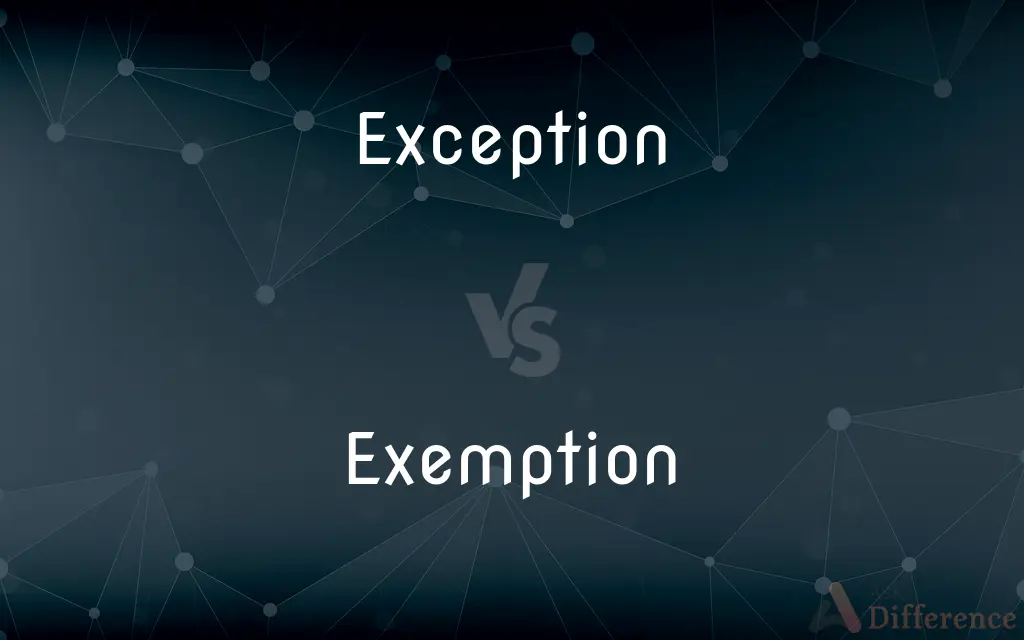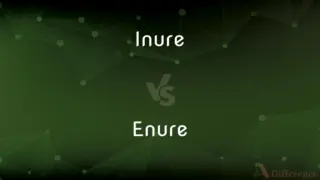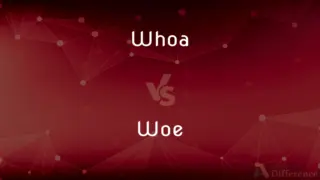Exception vs. Exemption — What's the Difference?
By Tayyaba Rehman — Updated on October 11, 2023
"Exception" is an instance or case not conforming to the general rule, while "exemption" is a relief from an obligation or duty.

Difference Between Exception and Exemption
Table of Contents
ADVERTISEMENT
Key Differences
An exception often refers to something that does not follow the standard or norm, a deviation. On the flip side, an exemption generally involves a relief or freedom from a particular obligation, usually granted under specific conditions.
When one speaks of an exception, it could be in regard to a situation, condition, or thing that doesn't conform to the general pattern. An exemption, however, often has legal or formal implications, highlighting a privilege or right not to follow a certain rule or regulation.
For instance, in a class where all students are under 18, a 19-year-old would be an exception. However, if there's a tax that everyone must pay but certain individuals are legally spared from it, they have an exemption.
It's crucial to note the difference in context. An exception might arise naturally or unexpectedly, due to anomalies. An exemption, meanwhile, is typically the result of a formal decision, often backed by law or an authoritative body.
While both terms denote some form of deviation from the norm, exception leans towards a descriptive stance, and exemption towards a prescriptive or legal one.
ADVERTISEMENT
Comparison Chart
Part of Speech
Noun
Noun
Meaning
A case that does not follow the general rule
A relief from an obligation or duty
Usage
Describes anomalies or deviations
Indicates legal or formal relief from specific duties
Grammatical Companions
Often followed by "to" (exception to the rule)
Often followed by "from" (exemption from tax)
Examples
"She's the exception to the rule," "With few exceptions"
"He got a tax exemption," "Seeking exemption from duty"
Compare with Definitions
Exception
A case where a rule or norm does not apply.
She's the exception to the general rule.
Exemption
A special dispensation from a rule or requirement.
The village had an exemption from the country's laws.
Exception
A distinctive rarity.
His kindness is an exception in today's world.
Exemption
A deduction allowed to reduce taxable income.
There are certain exemptions for homeowners.
Exception
A person or thing that is excluded from a general statement or does not follow a rule
The administrator made an exception in the Colonel's case and waived the normal visiting hours
He always plays top tunes, and tonight was no exception
Exemption
Freedom from penalty or fault.
The company was granted exemption from certain regulations.
Exception
The act of excepting or the condition of being excepted; exclusion.
Exemption
The process of releasing from a responsibility.
Students with disabilities might get exemption from certain exams.
Exception
One that is excepted, especially a case that does not conform to a rule or generalization.
Exemption
The action of freeing or state of being free from an obligation.
He received an exemption from military service.
Exception
An objection or a criticism
Opinions that are open to exception.
Exemption
The action of freeing or state of being free from an obligation or liability imposed on others
Vehicles that may qualify for exemption from tax
Exception
(Law) A formal protest against a ruling of the trial court on a question of law, such as the admissibility of a certain piece of evidence, to make clear for the record that the issue is being preserved for a potential appeal.
Exemption
The act or an instance of exempting.
Exception
The act of excepting or excluding; exclusion; restriction by taking out something which would otherwise be included, as in a class, statement, rule.
The exception of a rule
Exemption
The state of being exempt; immunity.
Exception
That which is excluded from others; a person, thing, or case, specified as distinct, or not included.
That rule is usually true, but there are a few exceptions.
Exemption
An exception of certain property from bankruptcy or taxation.
Exception
(legal) An objection, on legal grounds; also, as in conveyancing, a clause by which the grantor excepts or reserves something before the right is transferred.
Exemption
The deduction of a certain amount in the computation of net income with regard to taxation, allowed for an individual, that individual's dependents, and certain characteristics, such as blindness or age.
Exception
An objection; cavil; dissent; disapprobation; offense; cause of offense; — usually followed by to or against.
Exemption
Excuse from performance of a legal duty, such as release from serving in the military or as a juror.
Exception
(computing) An interruption in normal processing, typically caused by an error condition, that can be raised ("thrown") by one part of the program and handled ("caught") by another part.
Exemption
An act of exempting.
Exception
The act of excepting or excluding; exclusion; restriction by taking out something which would otherwise be included, as in a class, statement, rule.
Exemption
The state of being exempt; immunity.
Exception
That which is excepted or taken out from others; a person, thing, or case, specified as distinct, or not included; as, almost every general rule has its exceptions.
Such rare exceptions, shining in the dark,Prove, rather than impeach, the just remark.
That proud exception to all nature's laws.
Exemption
A deduction from the normal amount of taxes.
Exception
An objection, oral or written, taken, in the course of an action, as to bail or security; or as to the decision of a judge, in the course of a trail, or in his charge to a jury; or as to lapse of time, or scandal, impertinence, or insufficiency in a pleading; also, as in conveyancing, a clause by which the grantor excepts something before granted.
Exemption
Freedom from a defect or weakness.
Exception
An objection; cavil; dissent; disapprobation; offense; cause of offense; - usually followed by to or against.
I will never answer what exceptions they can have against our account [relation].
He . . . took exception to the place of their burial.
She takes exceptions at your person.
Exemption
The act of exempting; the state of being exempt; freedom from any charge, burden, evil, etc., to which others are subject; immunity; privilege; as, exemption of certain articles from seizure; exemption from military service; exemption from anxiety, suffering, etc.
Exception
A deliberate act of omission;
With the exception of the children, everyone was told the news
Exemption
Immunity from an obligation or duty
Exception
An instance that does not conform to a rule or generalization;
All her children were brilliant; the only exception was her last child
An exception tests the rule
Exemption
A deduction allowed to a taxpayer because of his status (having certain dependents or being blind or being over 65 etc.);
Additional exemptions are allowed for each dependent
Exception
Grounds for adverse criticism;
His authority is beyond exception
Exemption
An act exempting someone;
He was granted immunity from prosecution
Exception
An instance or person not included in a general statement.
Everyone enjoyed the film with one exception.
Exception
A person or thing that is excluded from a general statement.
Fresh fruit is the exception in this dessert menu.
Exception
Strong objection to something.
I take exception to that remark.
Common Curiosities
Is every deviation an exception?
Typically, yes. "Exception" covers anything that doesn't conform to a general rule.
Is "exception" always about something negative?
No, it simply denotes something that deviates from the norm.
Can "exemption" refer to a tax situation?
Yes, people often seek tax exemptions to reduce their taxable amount.
How do I use "exception" in a sentence?
It's often used to highlight deviations, e.g., "He's an exception to the trend."
Are exemptions always legal?
Often, but not exclusively. They can also be informal or societal.
Does "exception" always imply rarity?
Not always, but it indicates deviation from a common trend or rule.
Is exemption always about relief?
Primarily, yes. It indicates relief from an obligation, duty, or rule.
Is "exemption" used outside of legal and financial terms?
Yes, it can be used more broadly to indicate any relief from a general requirement or obligation.
Can a person be an exemption?
Not typically. While a person can receive an exemption (like from military service), the term itself doesn't usually refer to individuals.
Can one ask for an exemption?
Yes, especially in legal or formal contexts, like seeking exemption from a rule.
Are the terms "exception" and "exemption" interchangeable?
No, while both denote deviations, "exception" refers to a deviation from a norm, whereas "exemption" indicates relief from a duty or obligation.
Does every rule have an exception?
Not necessarily. While the adage "every rule has an exception" is popular, it's not universally true.
Can an exception be standardized?
Over time, if an "exception" becomes common practice, it may lose its status as an exception and become the new norm.
Can there be an exception within an exemption?
Theoretically, yes. An exemption could have specific conditions with some exceptions.
Can there be multiple exemptions to a single rule?
Yes, a single rule might have several exemptions based on different criteria or conditions.
Are both terms used in legal contexts?
Yes, but "exemption" more frequently denotes legal or formal relief.
Are all exceptions rare?
Not necessarily. An exception simply indicates a deviation from a standard or norm, but doesn't comment on its frequency.
How do institutions determine exemptions?
Exemptions are usually determined based on specific criteria, which might be legal, ethical, or practical in nature.
Can "exception" be used in a positive context?
Yes, for instance, "She's an exception, truly outstanding in her field."
Are exemptions permanent?
Not always. Some exemptions are temporary and might have a set duration or expiration.
Share Your Discovery

Previous Comparison
Inure vs. Enure
Next Comparison
Whoa vs. WoeAuthor Spotlight
Written by
Tayyaba RehmanTayyaba Rehman is a distinguished writer, currently serving as a primary contributor to askdifference.com. As a researcher in semantics and etymology, Tayyaba's passion for the complexity of languages and their distinctions has found a perfect home on the platform. Tayyaba delves into the intricacies of language, distinguishing between commonly confused words and phrases, thereby providing clarity for readers worldwide.














































